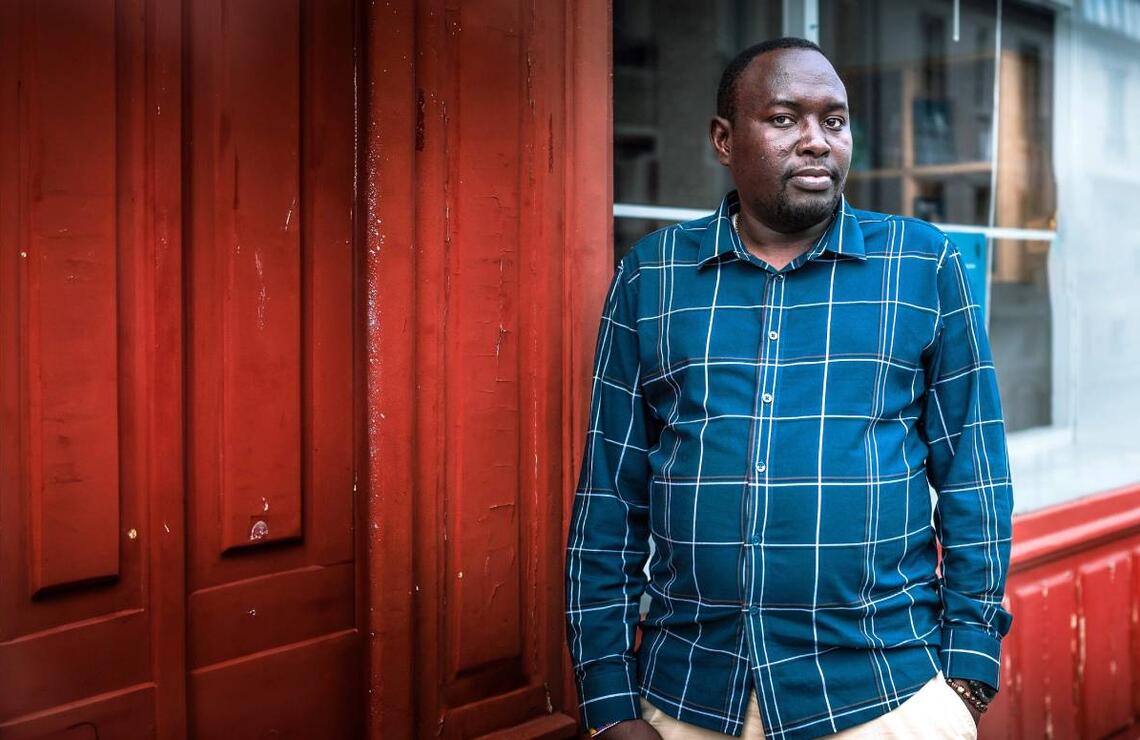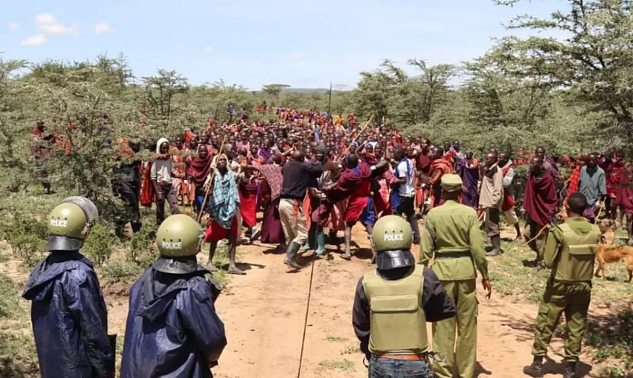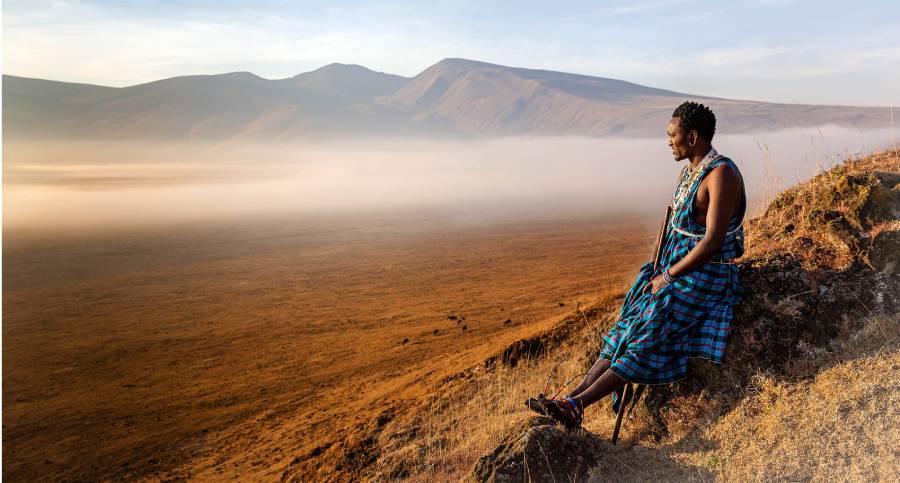
Maasais
Facing injustice
For over two years now, the Maasai, a pastoral people, have been driven from their ancestral lands. The reasons are political, essentially linked to tourism and an agreement between the government and OBC, a company from the United Arab Emirates. Confronted with this dispossession, the lawyer Joseph Oleshangay is determined to speak up for his people.
In the name of wildlife conservation, the Tanzanian authorities have been trying since 2022 to expel the Maasai people from their land and relocate them to the east of the country. This indigenous people, who are agropastoral and do not hunt, denounce a policy pursued for the benefit of mass tourism and luxury hunting, in particular by a UAE-based hunting company, OBC, with which the Tanzanian presidency maintains close relations. Maasai lawyer Joseph Oleshangay was in Europe in September to plead the cause of his people. We met him at the Paris offices of the NGO Survival International, which defends the rights of indigenous peoples around the world.
AM: Just over two years ago, in June 2022, the eviction of the Loliondo Maasai and their forced removal to the east of the country began. What is the situation now?

Joseph Oleshangay: The evictions are continuing in Loliondo, where 1,500 km2 have been turned into a hunting reserve for the sole benefit of the UAE company OBC. We went to court to try to recover our rights to this land. In July, the electoral commission sought to exclude Ngorongoro, on the pretext that the inhabitants were supposed to vacate the area and move to Msomera [600 km to the east, Ed.]. As a result, entire villages were struck off the electoral roll. So we mobilised the population and held demonstrations for six days. The authorities finally abandoned the plan to revise the electoral rolls. But this attempt to exclude us from the vote confirms that we are considered second-class citizens. In Ngorongoro, schools have already been destroyed and health clinics rendered inoperative [on his phone, he shows us a photo of a packed classroom, with schoolchildren crammed in, Ed.] Since October 2023, vehicles parked in front of bomas [traditional Maasai villages, Ed.] have been fined. Yet people need a means of transport in their daily lives to provide various services, such as ambulances or shopping. Shopkeepers delivering food have had to raise their prices to compensate for the fines. This is a new way of exerting pressure and making daily life impossible in Ngorongoro.
So far, how many Maasai from Loliondo and Ngorongoro have been displaced to Msomera?
Around 9,000 people have been displaced. But the land already belongs to other people, and this creates conflict between them and the new arrivals. Eight people from Msomera, whose land was allocated by the authorities to displaced people from Ngorongoro, have taken legal action. However, they have since been threatened and harassed by the police and authorities. In Loliondo, in June 2022, there were violent clashes and shootings [several dozen Maasai were wounded by the police, and a policeman killed by an arrow, Ed.]. And in Ngorongoro, where there is a lot of tourism, the actions are more subtle: they try to silence people by paying them the equivalent of $3,000 for a family to travel to Msomera. Then, in Msomera, the army is responsible for maintaining order [there is heavy military presence in the area, as the few journalists who discreetly went there saw, Ed.]. In the Ngorongoro area, at least, we still have the opportunity to make our voices heard. Evictions also took place last May in nine Maasai villages around Kilimanjaro international airport [near Arusha and Moshi, Ed.].
Are Tanzania's politicians, media and civil society questioning the links between the President and OBC?
The United Arab Emirates' influence on the Tanzanian authorities is the subject of public debate. Tanzania has concluded an agreement placing all its ports under the responsibility of the UAE's DP World. There have been protests about this, and some of those calling for demonstrations have been arrested and charged with treason, including the lawyers challenging the agreement with DP World in court. OBC's influence became more obvious than ever: its director openly held a Zoom call with ministers and senior government officials about OBC's Loliondo game hunting reserve.
Have you had any contact with Samia Suluhu Hassan, President of the United Republic of Tanzania?
We tried, but there was no response to our calls. The condition laid down before we could meet with her was that the demonstrations had to stop. But the latest news is that she is prepared to meet us.
Tourism is booming in Tanzania: the country has announced that there were two million visitors last year.
Two million visitors, including, it seems, a million coming to Ngorongoro. The authorities are reaping substantial revenues from tourism, but this is not translating into tangible benefits for Maasai communities. This is unfair and unbalanced development.
The Maasai communities are calling for a ‘Maasai vision of nature conservation and land sovereignty’, different to what indigenous peoples and NGOs like Survival International are calling ‘green colonialism’.

Exactly. We Maasai understand nature and take care of it. Unlike trophy hunting, Maasai agropastoralism is not the enemy of wildlife, it complements it. We want to develop a nature conservation model that is not violent towards people and does not involve land seizures. In our ideal vision of conservation, trophy hunting would be banned – it is immoral and incompatible with ecology. We are also calling for decisions to be taken by local communities, not by the government, in order to avoid the kind of profiteering that is currently taking place in the case of OBC. The Tanzanian model of ‘fortress’ conservation, with reserves emptied of their human population, is now being challenged not only by the Maasai, but also by opposition figures such as Tundu Lissu, a 2020 presidential candidate for the Chadema party (the next elections are scheduled for October 2025). In August, the Catholic Church condemned the removal of Maasai villages from the electoral roll, and the Tanganyika Law Society (the Lawyers' Association of mainland Tanzania) asked a team to investigate the situation in Ngorongoro.
Blue Carbon LLC, another UAE company, has been signing carbon credit agreements with African countries since 2023, including, it seems, Tanzania.
Several villages in the Longido district, in the Arusha region, are now subject to carbon credit projects. The agreements are signed by the authorities without consulting the local communities, who will be the first to be impacted. We're talking about millions of hectares - 8 million in Tanzania - without any details about the content of these agreements. The local villagers hardly dare to talk about it. They are intimidated, unaware of the content of the agreements, and fear a future change in the land tenure status of their lands.